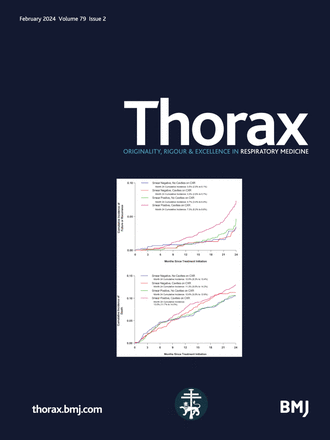Sleep-disordered breathing in children and adults with intellectual disability: mind the gap!
IF 9
1区 医学
Q1 RESPIRATORY SYSTEM
引用次数: 0
Abstract
Background In adults and children with intellectual disability (ID), sleep -disordered breathing (SDB) is thought to be common. However, large epidemiological studies are lacking, and there are few studies on optimal methods of investigation and even fewer randomised, controlled intervention trials of treatment. Method Peer-reviewed publications from various databases were examined in line with search terms relevant to ID and SDB spanning the years 200-2024. Results Findings suggest that, due to comorbid conditions, children and adults with ID may experience both an increased risk of SDB, as well as lower frequency of diagnosis. SDB can compromise the emotional, physical and mental health of individuals with ID. Appropriate treatment when tolerated leads to an improvement in health and well-being and several studies emphasized the importance of consistent follow-up of people with ID - something that is not universally occurring during childhood, in the transition to adulthood and during adulthood itself. As the most frequently occurring form of ID worldwide, we use Down syndrome as a specific example of how diagnosing and treating SDB can lead to improved outcomes. Conclusions This review highlights the importance of identifying SDB in this heterogenous population, recognising the multi-faceted, deleterious consequences of untreated SDB in people with ID, and presents some strategies that can be harnessed to improve diagnosis and management. Until further ID-specific research is available, we urge flexibility in the approach to people with ID and SDB based in guidelines and standard practice developed for the typically developing population.智障儿童和成人的睡眠呼吸障碍:注意差距!
背景 在智障(ID)成人和儿童中,睡眠呼吸障碍(SDB)被认为很常见。然而,目前尚缺乏大规模的流行病学研究,有关最佳调查方法的研究也很少,而有关治疗的随机对照干预试验更是少之又少。方法 根据与 ID 和 SDB 相关的检索词,对各种数据库中 200-2024 年间的同行评审出版物进行了研究。结果 研究结果表明,由于合并症的存在,患有智障的儿童和成人患 SDB 的风险可能会增加,但诊断的频率却较低。SDB 会损害智障人士的情绪、身体和心理健康。一些研究强调了对智障人士进行持续跟踪随访的重要性--在儿童期、向成年过渡期间以及成年期,这种做法并不普遍。唐氏综合征是全球最常见的智障形式,我们以唐氏综合征为例,说明诊断和治疗 SDB 可如何改善治疗效果。结论 本综述强调了在这一异质人群中识别 SDB 的重要性,认识到了未经治疗的 SDB 对智障人士造成的多方面有害后果,并介绍了一些可用于改善诊断和管理的策略。在开展针对智障人士的进一步研究之前,我们呼吁根据为发育正常人群制定的指南和标准做法,灵活处理智障人士和 SDB 患者的问题。
本文章由计算机程序翻译,如有差异,请以英文原文为准。
求助全文
约1分钟内获得全文
求助全文
来源期刊

Thorax
医学-呼吸系统
CiteScore
16.10
自引率
2.00%
发文量
197
审稿时长
1 months
期刊介绍:
Thorax stands as one of the premier respiratory medicine journals globally, featuring clinical and experimental research articles spanning respiratory medicine, pediatrics, immunology, pharmacology, pathology, and surgery. The journal's mission is to publish noteworthy advancements in scientific understanding that are poised to influence clinical practice significantly. This encompasses articles delving into basic and translational mechanisms applicable to clinical material, covering areas such as cell and molecular biology, genetics, epidemiology, and immunology.
 求助内容:
求助内容: 应助结果提醒方式:
应助结果提醒方式:


